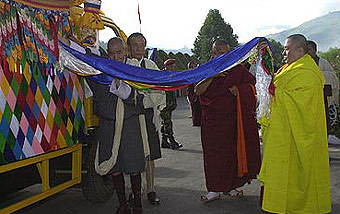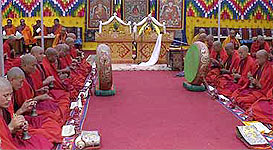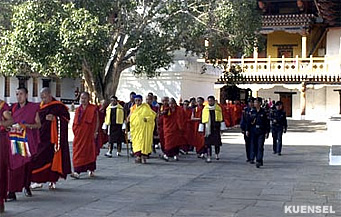| His
Holiness - The Je Khenpo |
 |
Bhutan Religion |
|
 |
Bhutan Religion |
|
|
|
|
The
Je Khenpo
|
 |
| Religion
plays a vital part in the life of the country, and the senior religious
figure, the Je Khenpo ( Head monastic Preceptor) is theoretically
of equal rank with the King.
Lopen are the highest ranking lamas just under His Holiness Je Khenpo.
There
are approximately 5,500 monks in Bhutan, half under the patronage of the
Je Kenpo, the other half subsidised by private patronage. There are also
approximately 15,000 lay monks called Ngakpa or Gomchen. |
|
 |
The
religious communities are central to the lives of the Bhutanese, and Bhutanese
life incorporates religion to an extent not seen in western Europe for
hundreds of years. Central to this life is the idea of the accumulation
of merit during ones life in order to aid the well being of this and the
prospects for subsequent lives.
This
spiritual health is aided by among other things daily devotions and prayers,
pilgrimages, offerings, donations and sponsorship of ceremonies. Dzongs,
or monastery fortresses/lamaseries have been at the centre of the political,
intellectual and artistic life of the country, and, unlike post cultural
revolution Tibet still maintain their role today.
 |
| The
Dzongs are the focus for all religious celebrations, and house the historic,
artistic and cultural wealth of the nation.
Religious
affairs were charged to another leader, the Je Khenpo (Chief Abbot
of Bhutan). For two centuries following Zhabdrung's demise, civil wars
intermittently broke out, and the regional Penlops (governors) became increasingly
more powerful. |
|
This
ended when an assembly of representatives of the monastic community, civil
servants and the people, elected the Penlop of Trongsa, Ugen Wangchuck,
the First King of Bhutan in 1907.
The
monarchy has thrived ever since, and the Fourth King, His Majesty Jigme
Singye Wangchuck, commands the overwhelming support for his people.
 |
| Je Khenpo and the Central Monkbody, Punakha dzong |
Commitment
to promoting health care comes from the highest level in the clergy.
The
country's spiritual leader, the Je Khenpo (Chief Abbot), has publicly
endorsed health messages such as family planning, and promoted the use
of iodized salt to prevent goitre, mental retardation and other disorders
due to iodine deficiency. |
|
The Je Khenpo has also actively discouraged the consumption of tobacco
and alcohol. All these initiatives have raised the awareness and the standards
of health and hygiene within the religious community, starting with the
young novitiates.
 |
|
The Je
Khenpo
|
 |
|
Punakha
dzong
|
|







